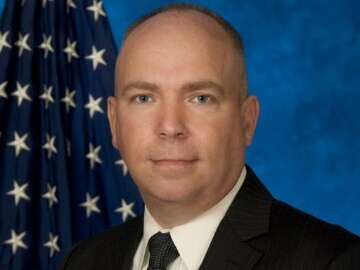New locality-pay adjustments will impact thousands of federal workers
In today's Federal Newscast, the IRS is getting billions more for enforcement, and some feds in the West and Pacific Northwest expect some locality pay to be in...
Best listening experience is on Chrome, Firefox or Safari. Subscribe to Federal Drive’s daily audio interviews on Apple Podcasts or PodcastOne.
- The Federal Salary Council is taking steps to add and adjust pay locality for some federal workers. The council has accepted recommendations from a working group to add Fresno, California, and Spokane, Washington, as new pay locality areas, which would impact about 11,400 employees. But before those new pay localities can become official, the president’s pay agent, comprised of leaders from the Labor Department, Office of Management and Budget and Office of Personnel Management, must finalize the recommendation. There are currently 53 pay localities for feds.
- After decades of funding cuts, the IRS stands to gain a lot from the Inflation Reduction Act the Senate passed yesterday. According to the Congressional Budget Office, $5.2 billion of the agency’s $80 billion increase would arrive in the fiscal year that starts in October. The rest would be spread out over the next decade. Most of the new funding is dedicated to enforcement and improved customer experience. CBO estimates the added enforcement funding would increase federal revenues by more than $200 billion over the next decade. (Federal News Network)
- The Pentagon announced a new general as the face of the Defense Department. For a year and a half, John Kirby has stood behind the Pentagon podium and fielded questions from reporters. Now, Kirby is off to a position at the White House and there’s a new press secretary in town. Air Force Brig. Gen. Patrick Ryder is taking over as the head spokesman at the Defense Department. Ryder currently serves as the Air Force director of public affairs. He will spend the next few weeks closing out those responsibilities before taking over the new position. Ryder served as the spokesman for the Joint Staff from 2017 to 2019.
- The military’s oversight of GPS systems for operations needs improvement, according to the Government Accountability Office. GAO found DoD does not have enough information about its four alternatives to existing GPS systems so that the military services can make the best decisions. DoD relies on GPS for accurate position, navigation, and timing data. But cybersecurity threats and jamming can make the data unreliable. DoD is modernizing the technology with features like a stronger encrypted signal known as M-code and anti-jam antennas.
- Defense Secretary Lloyd Austin declined Washington, D.C Mayor Muriel Bowser’s request for the National Guard’s help as thousands of migrants are arriving on buses from the South and Southwest. Bowser said the Pentagon had concerns about the open-ended nature of the request. They also declined to allow the use of the D.C. Armory. FEMA already donated $1 million to feed and shelter migrants, but the resources are running out. As of mid-July, about 5,200 migrants have arrived on buses from Texas. And, as of Aug. 3, more than 1,300 migrants have been bussed-in from Arizona. (Federal News Network)
- A new report finds that federal employees’ salaries are often significantly lower than those in the private sector. The Federal Salary Council reported that in 2021, federal employees made an average of 22.5% less than private sector workers in similar positions. That’s a slight drop from the last time the council calculated the pay gap, at 23.1% in late 2020. The report comes as the White House is proposing a federal pay raise of 4.6% across the board for 2023. (Federal News Network)
- Donald Cravins Jr. will be the first Under Secretary of Commerce for the brand new Minority Business Development Agency (MBDA). As the first undersecretary, Cravins will oversee MBDA’s work with the nation’s 9.7 million minority-owned businesses. Cravins is an attorney and a former member of the Louisiana legislature. Most recently, he served as the chief operating officer at the National Urban League, leading diversity, equity and inclusion initiatives.
- The Department of Homeland Security is hiring a new director for its Procurement Innovation Lab. The lab sits under the chief procurement officer at the DHS management directorate. It serves as a space where DHS can experiment with novel procurement approaches. The director is expected to be the department’s principal adviser on nontraditional acquisition models, like other transaction agreements and commercial solutions openings.
- The Education Department’s chief information officer is on the move. Education CIO Jason Gray is leaving his post later this month to take the CIO job at the United States Agency for International Development. USAID hasn’t had a permanent CIO since January. Gray has been with the Education Department since 2016. He oversaw the modernization of the agency’s IT infrastructure, and the shift from data centers to the cloud. The Education Department has yet to confirm his replacement. (Federal News Network)
- The Defense Department is adding a five-year extension to its program providing care to people with autism. The program was set to expire in 2023, but will now continue until at least 2028. The Comprehensive Autism Care Demonstration for TRICARE-eligible beneficiaries, provides applied behavior analysis services to service members and their families. DoD said it’s expanding the program’s timeframe because it needs more time to evaluate its effectiveness.
- A landmark federal program for children’s health care turned 25 years old. The Children’s Health Insurance Program or CHIP marked a quarter century on Friday. In President Biden’s comments on the anniversary of the Medicaid program, which was established as part of the Balanced Budget Act of 1997, he noted that Medicaid has since given health insurance coverage to 6 million children. While funding for CHIP is set to expire in another five years, researchers at Georgetown University recommended changes to program eligibility and having permanent quality measures.
- More than ever, community-led partners and public engagement are driving scientific innovation for agencies. From fiscal 2019 to fiscal 2020, the White House Office of Science and Technology Policy reported a record 172 prize competitions and challenges, and 97 crowdsourcing and citizen science activities. GSA’s web platforms, Challenge.gov and CitizenScience.gov, are increasingly used to engage the public in competitions. At the recent Open Innovation Forum, GSA Administrator Robin Carnahan said it is government’s job to create easy ways to engage the public and generate ideas.
Copyright © 2024 Federal News Network. All rights reserved. This website is not intended for users located within the European Economic Area.
Peter Musurlian
Peter Musurlian is a producer at Federal News Network.
Follow @PMusurlianWFED
Related Stories
Related Topics
All News
autism
Congressional Budget Office
Department of Homeland Security
Donald Cravins Jr.
Federal Drive
Federal Newscast
Federal Salary Council
General Services Administration
Government Accountability Office
GPS
health care
immigration
IRS
Labor Department
locality pay
Minority Business Development Agency
minority-owned businesses
National Guard
Office of Management and Budget
Office of Personnel Management
Patrick Ryder
Pay
Pay & Benefits
procurement innovation lab
science and technology
Tom Temin
TRICARE
White House Office of Science and Technology Policy
Workforce





